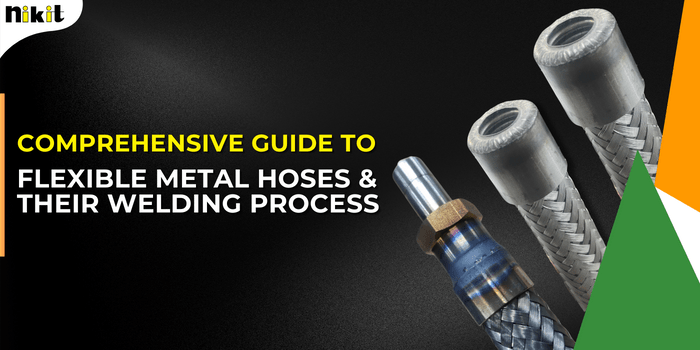In the world of industrial processes, where precision and flexibility are paramount, Flexible Metal Hoses and Their Welding Process play a pivotal role. These versatile components serve as conduits for conveying various media such as liquids, gases, and even solids in a wide range of applications. This comprehensive guide will explore the intricacies of flexible metal hoses, their welding processes, and their diverse uses across various industries.
Thank you for reading this post, don't forget to subscribe!
Understanding Flexible Metal Hoses
1.1 What are Flexible Metal Hoses?
Flexible metal hoses are a type of flexible conduit designed to transport a variety of substances through their inner core while providing structural support through their outer metal casing. They are constructed using high-quality materials, most commonly stainless steel due to its exceptional strength and resistance to corrosion.

1.2 Construction and Components
Flexible metal hoses typically consist of the following components:
- Inner Core: This is the primary conduit through which the media flows. It is constructed from materials compatible with the substance being transported, ensuring chemical compatibility and preventing contamination.
- Braid Layer: Around the inner core, a layer of stainless steel or other suitable material braids provides structural reinforcement. The braid layer enhances flexibility while maintaining high-pressure capabilities.
- Outer Jacket: The outer layer, usually made of stainless steel, acts as a protective shield, providing resistance to environmental factors such as heat, corrosion, and mechanical stress.
1.3 Types of Flexible Metal Hoses
– Corrugated Metal Hoses: These feature a helical or annular corrugated design for enhanced flexibility and pressure resistance.
– Annular Metal Hoses: These are constructed with a single-layer corrugation, providing excellent flexibility and absorption of axial movement.
– Helical Metal Hoses: Characterised by a spiral-shaped corrugation pattern, these hoses are ideal for applications demanding high flexibility and lateral movement.
Welding Processes for Flexible Metal Hoses
2.1 TIG Welding
Tungsten Inert Gas (TIG) welding is the most common welding process used for joining flexible metal hoses. It offers precise control, ensuring a clean, strong, and reliable weld. TIG welding minimises the risk of contamination and distortion, critical for maintaining the integrity of the hose’s inner core.
2.2 Spot Welding
In some cases, spot welding may be used to attach end fittings to the metal hose. This process involves localised heat application, making it suitable for specific applications where TIG welding is less practical.
Applications Across Industries
3.1 Petrochemical Industry
- Transporting Hazardous Chemicals: Flexible metal hoses are used to transport highly corrosive chemicals and liquids safely.
- Heating and Cooling Systems: They are vital for conveying hot and cold fluids in industrial heating and cooling systems.
3.2 Aerospace Industry
- Fuel and Hydraulic Systems: In aircraft, these hoses are employed to transport fuel and hydraulic fluids under high pressure and in demanding environmental conditions.
- Engine Exhaust Systems: Flexible metal hoses are used to mitigate vibrations and movement in aircraft exhaust systems.
3.3 Food and Beverage Industry
- Sanitary Transfer: In the food and beverage sector, these hoses are crucial for transferring liquids without contamination.
3.4 Pharmaceutical Industry
- Sterile Fluid Transfer: They ensure the contamination-free transfer of pharmaceutical fluids and chemicals in a controlled environment.
3.5 Automotive Industry
- Exhaust Systems: Flexible metal hoses are used in automotive exhaust systems to handle high-temperature exhaust gases and reduce vibrations.
- Suspension Systems: They help manage suspension system movements in heavy-duty vehicles.
The Nikit Engineers Distinction: FREE Weld Trial
What distinguishes Nikit Engineers is their unwavering dedication to excellence and ingenuity, as epitomized by our FREE Weld Trial Services. This affords clients the opportunity to acquaint themselves with the unparalleled quality of Nikit Engineers’ welding services prior to embarking on a project.
Through the provision of cost-free weld trials, Nikit Engineers offer clients a tangible manifestation of their welding proficiency, enabling them to make well-informed decisions. This approach not only fosters trust but also underscores their steadfast commitment to delivering extraordinary outcomes.
Flexible metal hoses are indispensable components that bridge the gap between the need for structural integrity and the demand for flexibility. Their construction, welding processes, and broad range of applications make them vital in various industries, ensuring the safe and efficient transportation of liquids, gases, and solids. As industries continue to evolve, flexible metal hoses will undoubtedly play an increasingly pivotal role in the future of manufacturing and automation. For reliable solutions in welding automation and robotic solutions related to flexible metal hoses, you can trust Nikit Engineers to meet your specific needs.
